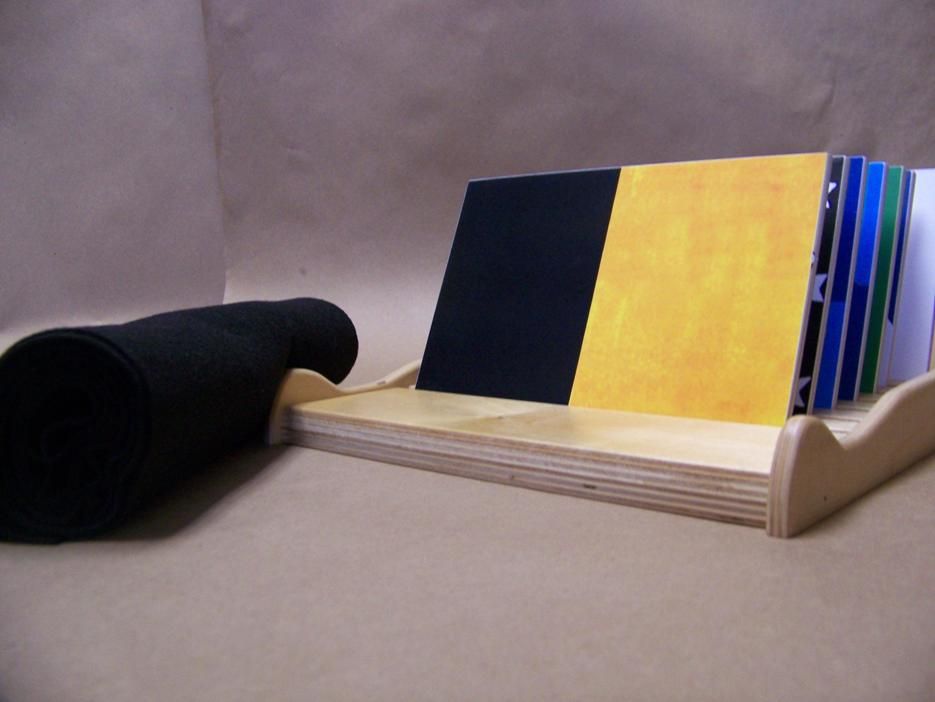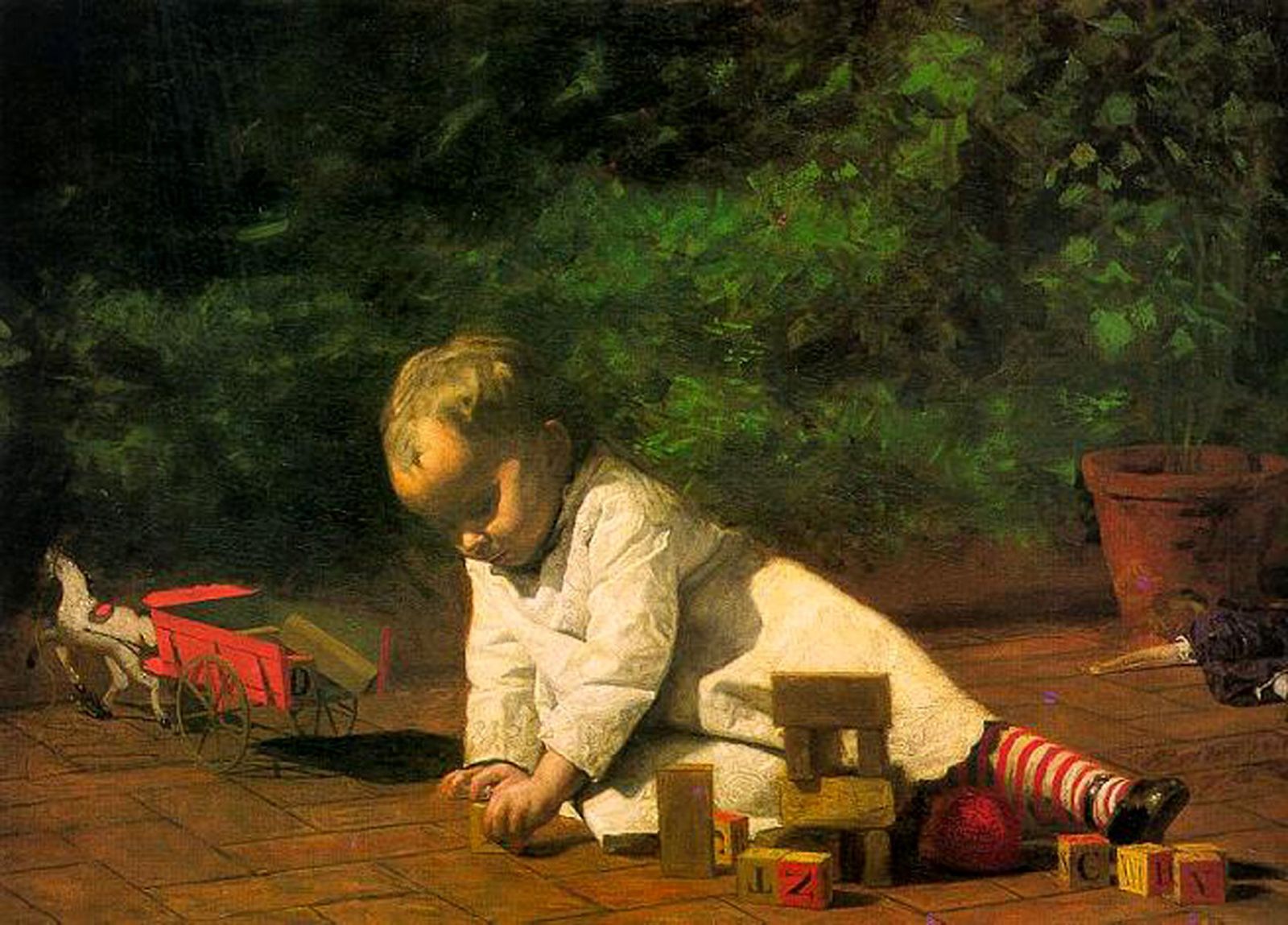Gifts in Godly Play

Rebecca Nye considers some of the ways in which gifts appear in Godly Play stories, and wonders what the gift of Godly Play might really be.
Let’s start at the beginning. In the Godly Play Creation story, the storyteller asks ‘I wonder what is the biggest gift you have ever received?’ This seems to break the rules of the sacred story genre by inviting some wondering before we get into the main narrative. Why do we do that? I think it’s about reframing the narrative in at least two ways.
First, having this preparatory chat about gifts in general can help to shift the circle out of a literal and perhaps limited mindset in which Creation is thought of as ‘making material stuff’. In the carefully-worded script, God is never described as making land, or days or people, rather God gives the gift of these things. This subtlety changes the narrative from being like the ‘method section’ of a science report to the description of an act of kindness. ‘Giving the gift’ implies a relationship, from someone and to someone, in contrast to ‘making’ which could be quite solitary. So, this is a deliberate and valuable way of teaching a theological perspective on the first Creation narrative. For children under ten this can be especially helpful as their natural psychological tendency can be to latch onto a literal mode of interpretation, which may fall apart when they develop a capacity for more abstract thinking. Presenting them with a traditional image of God as a ‘making’ figure risks conjuring up ideas about giant-scale materials and a kind of magical ability to manufacture this or that. If this happens, there will be bumps, if not crashes, when children encounter other models of understanding, especially evolution and the Big Bang theory. Emphasising ‘God gave the gift’ instead of ‘God made’ is itself a really crucial gift that Godly Play offers, so that people of any age and all kinds of perspectives (literalists, Creationists, those taking a poetic interpretation, etc.) can enter the story on their own terms, and together.
Asking before we even begin, ‘I wonder what’s the biggest gift…?’, leads to the second way the narrative is reframed.
Inviting wondering before the story gets going is usually something reserved for parables in Godly Play, because they need such a lot of creative imagination to help us enter their sideways, upside-down kind of thinking. So, with parables, the ‘pre-wondering’ questions help to establish that the story that follows is not straightforward narrative – we don’t get straight into it. However, using this technique for the Creation story may also subtly prompt participants to appreciate this sacred story’s mythical qualities, its credibility as a wonderful poem or song of our origins in God, and for some, a kind of history too. In other words, being asked about ‘the biggest gift’ gives an important hint that there’s a parable quality to this (i.e. there might be times when this feels hard to get into, as though the door is shut, that it’s difficult but it is worth coming back to…) So, this is another important function of the wondering about the ‘biggest gifts’ with the circle before the story starts. It’s not just to pass the time, nor is it merely a device to ‘get the children involved’, rather it offers deep teaching that reframes the story and how much it calls for our creative response.
It is then interesting to look at what actually happens when this wondering question about gifts is asked in a Godly Play session. With adults, this wondering is sometimes very slow to start. Some assume that this is really a childish question, so they are embarrassed, or they might slip into role-playing childishly. With children, sometimes the question incites a kind of competition about who can claim to have had the biggest or costliest present. However, allowing that to run its course without any negative judgement nearly always sees the pattern broken by one a child who eventually suggests something that is not literally big or impressive. The hardest time I ever had with this question was with a group of children in a school where the pupils’ affluence seemed to have had a depriving effect on their spiritual sensitivity, and I really thought no one would break the pattern of expensive things. By contrast, trainer Andrea Harrison found that when she told the story to children in Kenya, every child from the age of 5 onwards said that ‘life’ or ‘my life’ was obviously the biggest gift.

Gifts and presence
I remember feeling overwhelmed after my initial research into children’s spirituality: I now knew what it was like, but I really didn’t know what to do to help it to flourish. I realised that it would be a lifetime’s work to develop a method that could channel an understanding of children’s spirituality into a practical approach to Christian nurture. Discovering that Jerome Berryman has given precisely a lifetime to this seemed to me to be a heaven-sent gift. It is evident that many others, worldwide, feel enormously grateful that Godly Play has been devised so carefully and that they are thankful for its deep, transformative effects on their work with children, in children’s lives and in their own spiritual journey. So my thoughts turn now to wider reflections on Godly Play’s ‘gift’ and ‘present’ metaphors.
It is fascinating to look into the etymology and definitions of the words ‘gift’ and ‘present’. The word ‘present’ has associations with the action of presenting something, whereas ‘gift’ has associations with a different action: giving . A gift is ‘something given voluntarily without payment in return, as to show favour, honour an occasion or make a gesture of assistance’ (Dictionary.com). These different connotations are worth pondering. In fact the word ‘gift’ comes from the proto Indo-European base and originally from the Sanskrit word ‘gabhasti’ which means ‘hand’ or ‘forearm’. So it really conjures up the sense of putting something into someone else’s hands. ‘Gabhasti’ is also the root of our word ‘habit’, which resonates brilliantly with the Godly Play Associates’ pledge of regular, habitual giving to Godly Play UK.
The word ‘present’ has a different sense, and comes from an Old French root. It signifies ‘being there’; it implies being around when something is offered or received. Just as the word ‘gift’ has deep religious (monastic) resonance with ‘things done with our hands ’ and with an attitude of habit , so there is also a kind of spiritual resonance with the meaning of ‘present’ as a form of presence , which might be God’s presence, or our own authentic presence in spiritual encounters. When Abraham found, at Bethel and Shechem, that ‘God was there’ – we see that God was ‘present’. Only a very short leap is required to recognise God’s presence as a present! Indeed, children sometimes hear the invitation, ‘Let’s enjoy the presence of God’, as ‘Let’s enjoy the presents of God’!
But how might an appreciation of the roots of these words make a difference to our thinking about children’s spirituality, and about Godly Play? Of all the Bible references to children, perhaps the best known is ‘Children are a gift from the Lord’ (Psalm 127). I wonder what the links between children, gifts and God could really be?

The gift of childhood
So, unearthing the connotations of ‘gift’ and ‘present’ encourages us to value physical, hand-to-hand reality, a habit of generosity rather than one off actions , and the importance of simply ‘being there ’. In turn perhaps, this offers a theology of childhood in a nutshell. First of all, through childhood we glimpse that the nature of God is inescapably tied up with physicality, a dependency on bodily care and love, characterised by movement and response – touching, hugging, being held. Secondly, through childhood we glimpse the nature of God as an ongoing project of renewal, a habit of giving more and a mindset of ‘again, again!’ And thirdly, children draw our attention to the virtue of presence , just being, rather than to a capacity to do things. Their true vocation is to be a child (and ours is to become like a child again), just as God’s own vocation is the archetypal ‘To be’: I am who I am (Exodus 3.14).
Perhaps there’s something in these reflections about gifts, God, children and Godly Play to take your own wondering further…
I wonder where you see the spirituality of physical encounter, of placing the gift of faith into
the hands of children as givers, and as receivers? How does Godly Play try to help that?
I wonder how Godly Play helps you to recognise children as presents and as signs of God’s
presence?
I wonder what part of Godly Play has been the biggest gift for you?